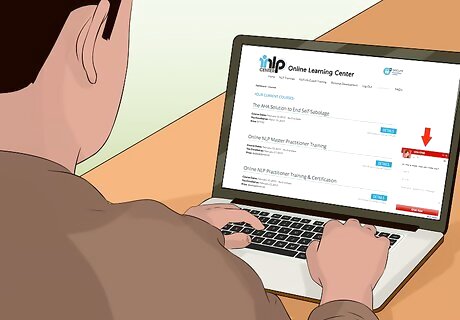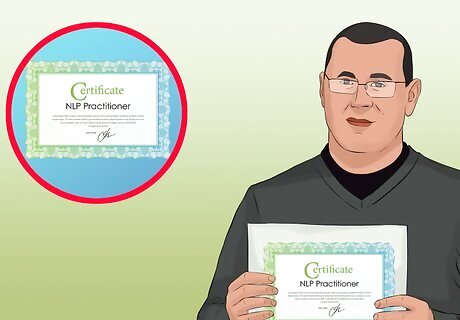
views
X
Trustworthy Source
PubMed Central
Journal archive from the U.S. National Institutes of Health
Go to source
Trying out NLP on Yourself

Set positive goals. When you start planning out what you want in life, focus on what you want, rather than on what you don't want. Don't make negative goals about things you want to lose or avoid. Instead, think of what you'd like to achieve, attain, and develop. Phrase your goals so that they best express your complete desire. For instance, if you want to have a partner, instead of making your goal "Meet someone special," make it "Live my life with someone I truly love." A goal that sounds satisfying to you will motivate you more than a goal that only expresses a step in the plan.

Ask yourself positive questions. Self-questioning is a fundamental practice of NLP. Ask questions about the things you would like to change in your life. Your mind tries to answer any questions you pose, so make sure to phrase your questions in a way that will lead to useful, positive answers. For instance, instead of asking "What's wrong with me?" you might ask: What can I do to feel better? In what ways would I like to change my life? How will my life improve if I make these changes?

Edit your mental images. Practitioners of NLP believe that thinking of an image of people, events, or other things can help you understand how you feel about them. To do this, picture someone or something that irritates you. Next, make changes to the image in your mind as if you were editing it on a computer. Picture people or things that make you feel bad turning darker and moving further away. Picture people or things that make you feel good turning brighter and coming closer to you. Notice how all these changes make you feel.

Mess with negative voices in your head. The way you speak to yourself in your head has a lot to do with your happiness and mental health. Most psychologists will tell you to notice how you are talking to yourself and change your tone to a loving and encouraging one. NLP has a different approach: it suggests that you mess with the sound of the negative voice so that it has less power. If you hear yourself thinking something like, "You'll never get this done," repeat the message but with a distorted sound. Make it sound like a goofy cartoon character, like Donald Duck or Spongebob. Notice how different versions of the voice make you feel.

Play out scenarios backward. When you have a bad experience that is haunting you, treat it like a movie. Play it backwards, starting from after it occurred to right before it occurred. Do this several times until you have memorized the backwards sequence. Now add a different ending, one that you like better. Notice how you feel about the experience.

Visualize colors and connect them with feelings you would like to experience. For example, if you want to feel confident, imagine a color that looks confident to you, such as a bright orange. Imagine a bright square of that color before you. In your mind, step into the square and focus on feeling that emotion. Imagine exactly how it would look and feel to be in the square. When you next want to experience this feeling, visualize the square in front of you. Step into it, and notice how you feel.
Becoming an NLP Practitioner

Practice on a regular basis. If you find NLP techniques helpful, make a regular practice of them. Try practicing once a day until you get in the habit of using your techniques whenever you need them. Consider keeping a diary where you track your NLP practice and results. Talk to a mental health counselor about what you are doing with NLP.

Take a class. You can pay to take workshops in NLP. There are summer trainings in Santa Cruz, California, as well as other places around the world. You can also find online courses with a quick internet search. There are profession-specific classes available in many cities. Consider getting a training for everyone at your place of work. While NLP is no longer considered a valid psychological tool, many places of work find it useful for inspiring a positive attitude in their team.

Get a certificate. Classes in NLP tend to come with certification. You can become certified simply as a practitioner, meaning someone who has taken a class in NLP. To be able to market yourself to teach NLP techniques to others, take training classes that will provide you with certification as a trainer or facilitator.

Consider alternative practices. While many people have found various practices of NLP useful, it isn't a scientifically verified school of thought, and in same cases is believed to have harmed traumatized practitioners. If your NLP practices are making you feel worse, or simply aren't changing your mental state, consider better supported forms of cognitive intervention. See a therapist. Try cognitive-behavioral therapy. Experiment with mindfulness practices


















Comments
0 comment